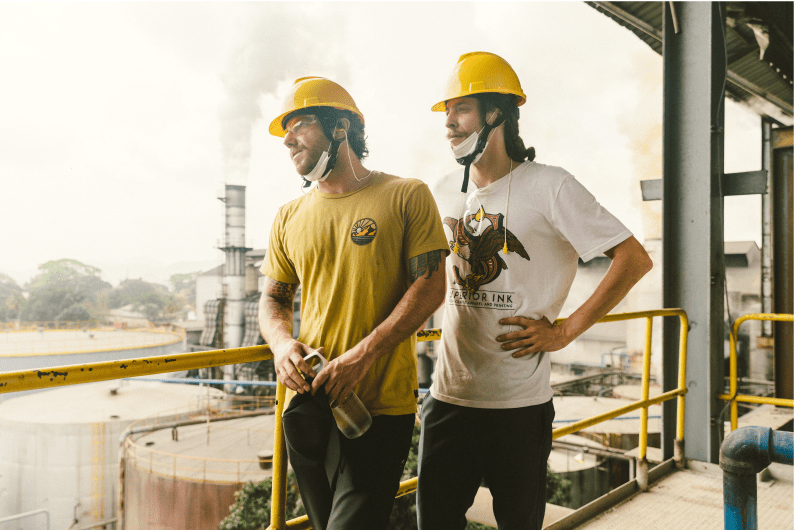MicroPlastic and Allmade - Good, Bad or Better?
Microplastic! Shirts and apparel have polyester in them, which in the wash degrades and goes into the water system, this eventually can end up in the oceans, especially impacting on coastal cities. Fish eat it, it gets into our food chain, and wammo, big issue! So with the hot topic on ocean plastic should we be using recycled polyester or water bottle apparel?
There are a few parts to this question. In 2019 California passed legislation pending that would require warning labels for garments with more than 50% poly content. The biggest issue is with fleece, especially when the inside is shredded, lightweight blends and performance knits like what we use with Allmade are not as much of a problem.
Why? This happens in the wash and in time laundry machine makers will be required to put in filters. That’s all it takes to eliminate 90% of the problem.
You can also hand wash your apparel and hang dry, this keeps the fibers in tact and don’t get shredded when we wash them. Steam dryers also completely solve this issue!
The next 2 questions are a bit bigger, but let's divide it into them.
- Is polyester bad?
- Is recycled polyester better for the environment?
1) Is Polyester Bad
Yes: In all respects, polyester is bad. We already know about the environmental impact. Toxicity-wise, the polymer is supposedly harmless but that is debatable. The monomers that it is made from are poisonous and carcinogenic. And, it is very probable that these monomers are still present, off-gas into the air, and are absorbed by our skin. If you are concerned about that, you should not, ever, wear polyester, recycled or not. Recycled polyester is not better or worse than virgin polyester toxicity-wise. It is the same.
2) Is Recycled Polyester Better For the Environment?
Yes: Recycled polyester a) doesn't use any new petroleum and avoid creating more eventual waste. b) the making of recycled polyester, or rPET, yarns use 94% less water than petroleum-based PET fibers. The production process uses 60% less energy and there is a 32% CO2 emissions reduction... so far better for the environment which impacts health overall.
Summary
In summary, we are throwing away over 300,000 million tons of plastic a year that could be recycled, this IS without a question ending up in the oceans and is a far greater problem them microplastics coming from a washing machine on coastal populations. Most of this comes from 3rd world countries many of which we use to make our garments, they don’t have the resources to clean up their environment or to get clean water so plastic is used and then not taken care of. See. https://www.ted.com/speakers/david_katz - Meanwhile we are using oil to make millions of polyester garments per year!
The majority of the world’s PET production – about 60% – is used to make fibers for textiles; and about 30% is used to make bottles. Think about that for a moment – bet you didn’t realize that those bottles that we’re all being told to recycle make up just 30% of PET production! Annual PET production requires 104 million barrels of oil – that’s 70 million barrels just to produce the virgin polyester used in fabrics.(2) That means most polyester – 70 million barrels worth – is manufactured specifically to be made into fibers, NOT bottles. Of the 30% of PET which is used to make bottles, only a tiny fraction is recycled into fibers. But the idea of using recycled bottles – “diverting waste from landfills” – and turning it into fibers has caught the public’s imagination. There are many reasons why using recycled polyester (often called rPET) is not a good choice given our climate crisis, but today’s post is concentrating on only one aspect of polyester: the fact that antimony is used as a catalyst to create PET. We will explore what that means.
https://oecotextiles.wordpress.com/tag/polyester/
Our Stance
We are looking for better options than rPET but for the time being we feel it is a good option to reduce water, chemical and oil consumption and use plastic trash. With proper education and more regulations we can prevent micro plastic from entering the oceans. So share it, wear it, and care for it!





